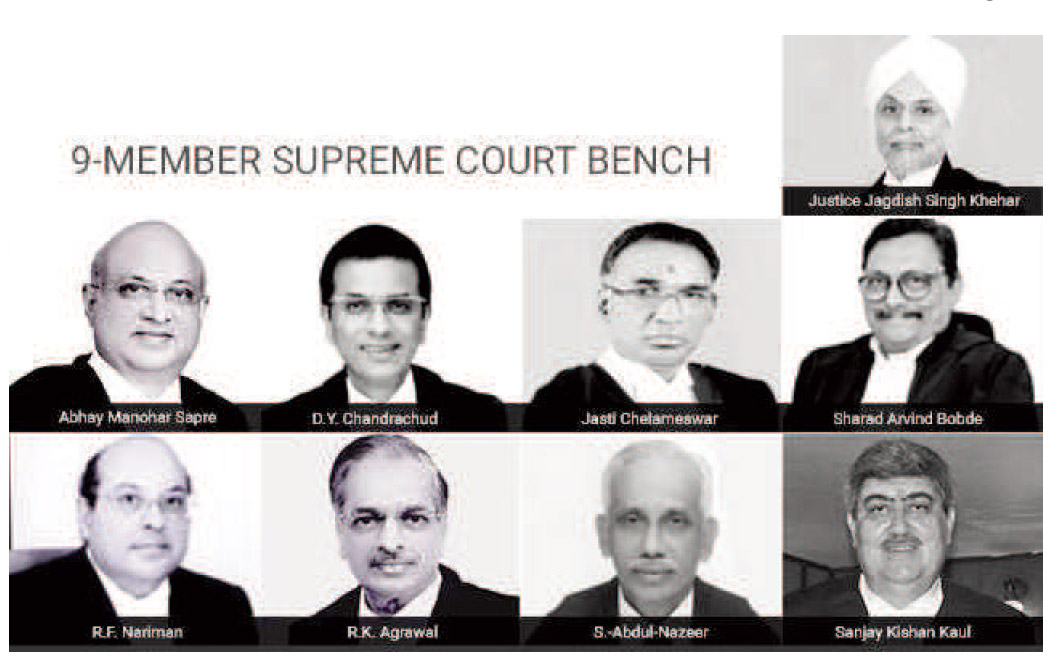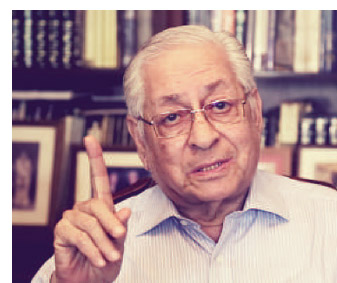Right to Privacy
fundamental
In a landmark verdict, the
right to privacy was on
Thursday (Aug 24)
declared a fundamental
right under the
Constitution by the
Supreme Court, which said
"privacy is the constitutional core
of human dignity".
The judgement, which will have
a bearing on the lives of all
Indians, said that "the right to
privacy is protected as an intrinsic
part of the right to life and
personal liberty under Article 21
and as a part of the freedoms
guaranteed by Part III of the
Constitution." The top court also
ruled that like other fundamental
rights, the right to privacy was not absolute and any encroachment
will have to withstand the
touchstone of permissible
restrictions.

A nine-judge Constitution
bench headed by Chief Justice J S
Khehar, which delivered as many
as six concurring verdicts,
overruled the contrary apex court
verdicts delivered in 1950 and
1962 in the M P Sharma and the
Kharak Singh cases holding that
right to privacy was not part of
the Constitution.
The top court rejected the NDA
government's vehement
contention that there was no
general or fundamental right to
privacy under the Constitution.
The lead judgement, penned by Justice D Y Chandrachud for
himself, the CJI, Justices R K
Agrawal and S A Nazeer, however,
asked the government to examine
and put in place a "robust regime"
for data protection in the modern
era.
However, the top court gave a
ray of hope to embattled
government, whose Aadhaar
scheme is under intense scrutiny
over privacy infringements, said,
"We commend to the Union
Government the need to examine
and put into place a robust
regime for data protection.
"The creation of such a regime requires a careful and sensitive
balance between individual
interests and legitimate concerns
of the state. The legitimate aims
of the state would include for
instance protecting national
security, preventing and
investigating crime, encouraging
innovation and the spread of
knowledge, and preventing the
dissipation of social welfare
benefits".
Besides the four judges
including the CJI, Justices J
Chelameswar, S A Bobde, Abhay
Manohar Sapre, Rohinton Fali
Nariman and Sanjay Kishan Kaul
wrote separate, but concurring
verdicts running into 547-pages.
The judgement was welcomed
by leading legal experts, including
Law Minister Ravi Shankar Prasad,
who is himself a lawyer. Noted
jurist Soli Sorabjee said "no
fundamental right is absolute. It
is always subject to reasonable
restrictions".
While senior advocate Indira
Jaising said "privacy is
fundamental. It certainly has an
impact on the day-to-day life. This
verdict prevents any kind of
snooping," senior lawyer Kapil
Sibal observed that like individual
freedom, "individual house,
marriages, sexual orientation,
right to space, right to move
freely, right to eat what an
individual likes, right to be left
alone are protected both within
the home and at public places to
the extent necessary."
The CJI pronounced the
summary of concurring verdicts in
a packed courtroom and said,
"the decision in M P Sharma
(1950) which holds that the right
to privacy is not protected by the
Constitution stands over-ruled.
"The decision in Kharak Singh
(1962) to the extent that it holds
that the right to privacy is not
protected by the Constitution
stands over-ruled".
The bench put at rest the
persistent query as to where Right to Privacy, if recognised as a
fundamental right, would be
placed under Part III (which
refers to such rights) the
Constitution.
It said that right to privacy was
protected as an intrinsic part of
the right to life and personal
liberty under Article 21 and rather, it can be traced to entire
Part III as and as a part of all the
fundamental rights. He then
proceeded to declare that all
verdicts, which recognised privacy
as a key component of
fundamental rights, delivered
post the M P Sharma and the
Kharak Singh laid down "the
correct position in law".
Justice Chandrachud, in his
verdict, dealt extensively with
findings arrived at in the M P
Sharma judgement that had held
that in the absence of a provision
similar to the Fourth Amendment
to the US Constitution, the right
to privacy cannot be read into the
provisions of Article 20(3) of the
Constitution.
A senior law officer
"welcomed the verdict"
by saying "it is a good
judgment" but refused to
come on record to
comment on the
outcome which has gone
against the stand taken
by the government. He
simply said the
judgement will have no
direct impact on the
Aadhhar scheme which is
under challenge before a
five- judge constitution
bench which will
examine the issue by
taking note of this
decision.
"The judgment does not
specifically adjudicate on whether
a right to privacy would arise
from any of the other provisions
of the rights guaranteed by Part
III including Article 21 and Article
19
"The observation that privacy is
not a right guaranteed by the
Indian Constitution is not
reflective of the correct position.
M P Sharma is overruled to the
extent to which it indicates to the
contrary," the verdict said.
Referring to the 1962 Kharak
Singh judgement, the verdict said
it was "correctly held that the
content of the expression ?life?
under Article 21 means not
merely the right to a person?s
'animal existence' and that the
expression ?personal liberty? is a
guarantee against invasion into
the sanctity of a person?s home
or an intrusion into personal
security."
"The first part of the decision in
Kharak Singh which invalidated
domiciliary visits at night on the
ground that they violated ordered
liberty is an implicit recognition
of the right to privacy. The second
part of the decision, however,
which holds that the right to
privacy is not a guaranteed right
under our Constitution, is not
reflective of the correct position.
"Kharak Singh to the extent
that it holds that the right to
privacy is not protected under the
Indian Constitution is overruled,"
it said. The bench then said that
life and personal liberty are
"inalienable rights" and they are
"inseparable from a dignified
human existence".
"Privacy with its attendant
values assures dignity to the
individual and it is only when life
can be enjoyed with dignity can
liberty be of true substance.
Following this verdict, a fivejudge
constitutional bench will
decide whether the Aadhar
violates the Right to Privacy or
not. On June 10, the top court had
ruled that from July 1 onward,
every person eligible to obtain
Aadhar card must quote their
Aadhaar number or their Aadhaar
Enrolment ID number for filing of
Income Tax Returns as well as for
applications for Permanent
Account Number (PAN).
The Income Tax Department
has stepped up its efforts to
encourage people to link their
PAN with Aadhar.
Meanwhile , the landmark
verdict of the Supreme Court has
been hailed by jurists and senior
advocates as "progressive" and a
"strong endorsement of the civil
liberty".
 Soli Sorabjee
Those lauding the unanimous
verdict of the nine-judge bench
were noted jurist Soli Sorabjee,
senior advocate Shyam Divan who
strongly batted for it, former law
minister Ashwani Kumar, BJP
spokesperson and senior advocate Aman Sinha and senior
advocate Indira Jaising.
Soli Sorabjee
Those lauding the unanimous
verdict of the nine-judge bench
were noted jurist Soli Sorabjee,
senior advocate Shyam Divan who
strongly batted for it, former law
minister Ashwani Kumar, BJP
spokesperson and senior advocate Aman Sinha and senior
advocate Indira Jaising.
A senior law officer "welcomed
the verdict" by saying "it is a good
judgment" but refused to come
on record to comment on the
outcome which has gone against
the stand taken by the
government. He simply said the
judgement will have no direct
impact on the Aadhhar scheme
which is under challenge before a
five- judge constitution bench
which will examine the issue by
taking note of this decision.
Senior Congress leader Kapil Sibal, who dubbed the judgement
as "historic", "progressive" and
"seminal," said "individual house,
marriages, sexual orientation,
right to space, right to move
freely, right to eat what an
individual likes, right to be left
alone are protected both within
the home and at public places to
the extent necessary."
Congress leader and
former law minister
Ashwani Kumar said
that the verdict "kept
faith with the
constitutional
morality and the
aspirations of the
people of India". He
said that the apex
court has
continuously enlarged
the domain of human
rights, which makes
India's constitutional
jurisprudence as a
"very progressive
jurisprudence".
Former Attorney General Soli
Sorabjee said that today's verdict
showed the "good approach" of
the Supreme Court which does
not hesitate in over-ruling its
previous verdicts.
He termed it "a very
progressive judgement which
protected the fundamental rights
of the people. Privacy is a basic
right which is inherent in every
individual."
Expressing hope that the
citizens would now be protected
from any kind of snooping, Jaising
called for "celebrations". "Privacy
is fundamental. It certainly has an
impact on the day-to-day life.
This
verdict prevents any kind of
snooping," she said. Divan termed the verdict as "a
strong endorsement of the civil
liberty, protected under the
Constitution". "It has to be seen
whether all the basic facilities
linked to Aadhar can be availed
otherwise as well and whether the
Aadhar meets the test," he said.
Congress leader and former
law minister Ashwani Kumar said
that the verdict "kept faith with
the constitutional morality and
the aspirations of the people of
India". He said that the apex court
has continuously enlarged the
domain of human rights, which
makes India's constitutional
jurisprudence as a "very
progressive jurisprudence".
"Indeed, the right to privacy
has been derived from Article 21
and if you were to look at the past
decisions of the Supreme Court,
in an expansive interpretation of
the Article 21, the SC has
continuously enlarged the domain
of human rights and that is why
India's constitutional
jurisprudence is cited in many
countries of the world as a very
progressive jurisprudence," he
said.
Sinha, also a senior advocate,
welcomed the verdict and termed
it as "good" but reminded that,
like any other fundamental right,
there will be reasonable
restrictions on the right to privacy
as well.
Sorabjee said, "The unanimity
of the bench in giving this
decision shows a very good
approach of the Supreme Court.
Any judgement which enlarges
the fundamental rights of the
people should be welcomed."
On a question related to
Aadhaar, he also reminded that
"You cannot make a blanket and
categorical statement that
Aadhaar will be banned or is
unconstitutional. No fundamental
right is absolute.
It is always
subject to reasonable
restrictions."
-- PTI, ANI Reports





 Soli Sorabjee
Soli Sorabjee